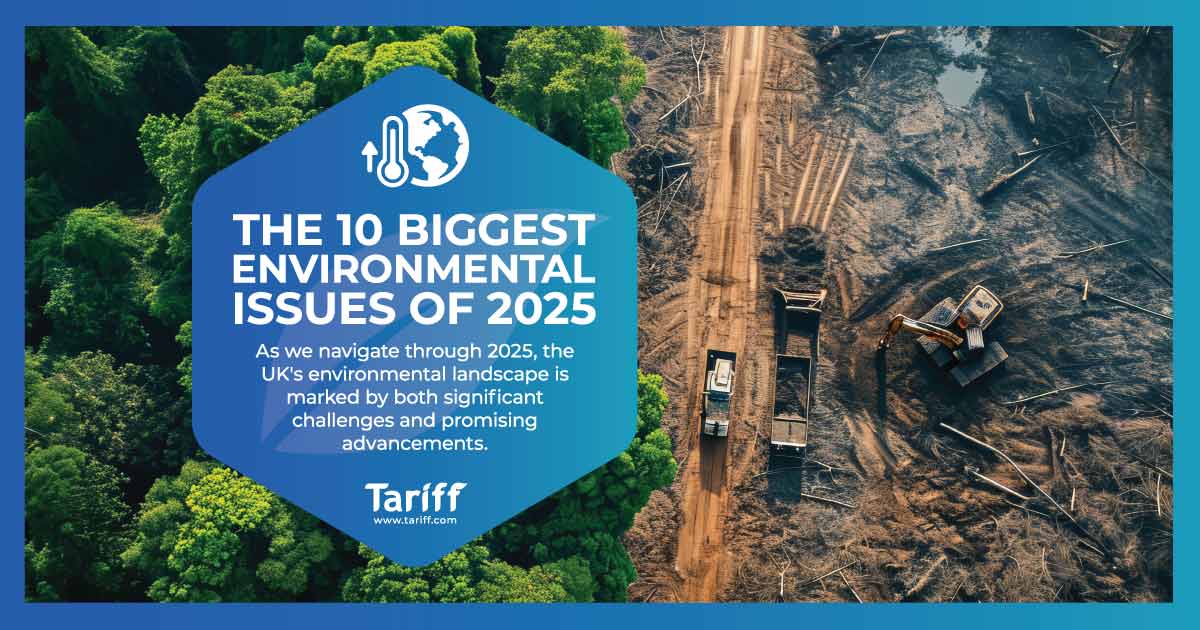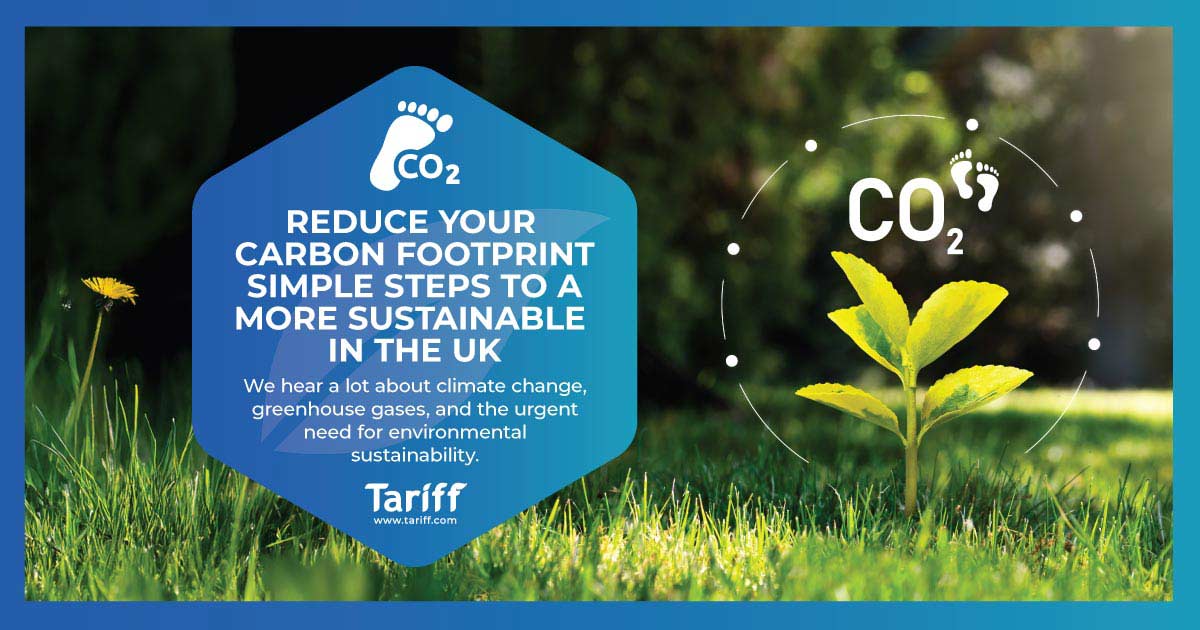How Does Your Business Affect the Environment?
As more and more people are starting to take action against climate change and pollution, businesses need to do their bit to protect the environment.
Whilst encouraging individuals to alter their lifestyle is all well and good, businesses, both large and small, are responsible for a large chunk of pollution and emissions.
Yet for businesses looking to do their bit for the environment, it can be hard to know where to start. Here at Tariff.com, we want to empower businesses to take control of their energy usage and carbon footprint. So if you’re starting to think about your business impact on the planet, keep reading. We’ve got some valuable advice for you and your company.
How Can Businesses Affect the Environment?
Understanding just how your business operations impact the environment is the first step towards making a positive change; you need to know where you’re starting to plan where you’re going. Here are the top 5 ways your business could be impacting the planet and contributing to climate change.
1)Energy usage
No matter what kind of business you run, you’ll no doubt use electricity and gas to power your operations and get the job done. There’s a good chance that this energy will come from burning fossil fuels, which releases greenhouse gases and carbon dioxide into the atmosphere. This, of course, contributes to issues of global warming and climate change, making your business part of the planet pollution problem.
2)Employee commute
Whilst some business may wash their hands of this particular issue, pollution caused by your employees’ daily commute could be considered your company’s responsibility, especially if you provide company vehicles or require your employees to travel as part of their job. Whilst all types of transport vary in terms of emissions (walking and cycling being the best, driving being the worst), your employees’ commute can contribute to your business carbon footprint.
3)Supply chain
No business is an island. No matter what industry you work in, you’ll no doubt rely on other businesses for equipment, materials, products or services, in other words, your supply chain. Yet all these other businesses will have their own ways and means of operating- and not all of them will be green or sustainable. Thinking about where your business supplies come from opens a whole other can of worms in terms of emissions and pollutions. Does it count if your business is a shining example of sustainability but partners and suppliers are still big polluters?
4)Natural resources
A natural resource is defined as ‘materials or substances occurring in nature which can be exploited for economic gain.’ No matter what type of business you run, you’ll probably use natural resources in some capacity, either using them to make and sell products or benefitting directly from those products. This could be anything from iron to make steel or paper to print letters. The only problem? A lot of natural resources are finite and will eventually run out. Extracting these resources also often involves damaging the environment.
5)Business waste
After we’ve consumed natural resources, we often generate waste. That sheet of paper you’ve printed will often end up in the bin, alongside any packaging that’s accompanied any equipment for your office. And then there’s the paper towels from your bathroom, plastic packaging from food or drink… the list goes on and on. All of your business’s waste will end up in a landfill decomposing or even polluting the ocean.
Why Businesses Need to Take Action Against Climate Change
As we reach a critical point in our fight against climate change, businesses have a moral obligation to act now. The way we do business often prioritises short-term profits over long-term sustainability, exploiting natural resources, causing pollution and contributing to climate change with little thought for the future.
Beyond this moral obligation, businesses cannot escape the impact of climate change. As the effects of rising temperatures make themselves felt, businesses will also be affected by drastic weather conditions, dwindling natural resources and economic damage. Addressing climate change now will ultimately benefit businesses.
How Can Businesses Reduce Their Environmental Impact?
If your business is looking to reduce its impact on the planet, here are the first steps you can take towards greener ways of operating.
1)Go Paperless
Thanks to advancements in digital and electronic signature technology, businesses no longer need to rely on archaic paper-based methods to run their businesses; they can now keep everything digital and eliminate the need for printing, scanning and physical paperwork storage altogether.
With business operations and customer interactions moving increasingly online, eliminating paper-based processes from your business operations not only reduces paper waste and associated carbon emissions but also simultaneously improves efficiency, whilst also saving money on paper, postage and stationery, as well as on printing and scanning equipment.
2)Conserve Energy
Whether you’re optimising your processes to waste less energy or insulating your office building to retain heat, identifying and fixing energy drainers can help you to reduce your business’s carbon footprint, as well as save money on your energy bills.
There are many simple ways to save energy around the office. You can switch to LED bulbs that are 80% more efficient than halogens, install motion-sensor lights and reduce energy consumption by 35-45 percent, or simply turn down the heating by a degree or two. For businesses that don’t know where to start, carrying out an energy audit in your office can help point you in the right direction, highlighting areas that could be improved and providing practical tips to conserve energy.
3)Goodbye single-use plastics
We all know the devastating impacts that single-use plastics can have on our environment, especially the harm they can cause to marine life in our oceans and seas. Single-use plastics are a particular scourge on the planet; those plastic cups your employees or visitors use once can last for up to 50 years in a landfill.
Switching from single-use plastics to biodegradable alternatives like wood or bamboo is a great place to start but offering reusable branded items to your employees could be a great opportunity to cut waste and also advertise and promote your company.
4)Offer Remote working
As remote working became the standard for businesses across the UK during the pandemic, we saw many surprise benefits beyond containing the spread of the coronavirus. One of these things was a reduction in carbon emissions due to a significant decrease in commuting.
Indeed, it’s estimated that continuing to implement remote working practices post-coronavirus could eliminate 11.3 billion miles of commutes, equating to a significant two airports’ worth of emissions. By offering flexible and home working options as standard, your business could reduce employee commuting miles, saving on carbon emissions and lowering your carbon footprint.
5)Support Carbon Offsetting
The term carbon neutral is becoming increasingly popular in the business world, especially with the UK aiming to become carbon neutral by 2050. Even if your business does everything it should for the planet, it can still be difficult to reach net-zero emissions. This is where carbon offsetting comes in.
Whether you’re supporting projects directly, or simply purchasing carbon credits, offsetting your remaining emissions is the only way to become carbon neutral or net-zero emissions. For many businesses, getting started with carbon offsetting can be difficult. Thankfully, there is a range of carbon consultancy solutions available for businesses, like Tariff.com.
Contact Tariff.com Today
If your business is looking to start its first steps towards green ways of operating, get in touch with our consultants today. We’ll get to know your business and its energy requirements, ensuring we provide a tailored service and personalised strategy that truly works for you.
Why You Should Choose Tariff.com
Transparent Service
Here at Tariff.com, we put transparency at the heart of all our energy services. We’re not affiliated with any single energy provider, so we’ll always shop around to find you the best deal on your green energy.
Industry Experts
We’ve pulled together an expert team of consultants, who can advise your business on anything from energy and going carbon neutral to security and IT. We use our experience and knowledge of the market to pass on great savings to you.
Empower Your Business
Beyond saving your business time and money, we aim to empower your business to get the most from your energy and chosen supplier. Whether that’s optimising energy usage, switching to green energy, or going carbon neutral, we’ll help you achieve your energy goals.




